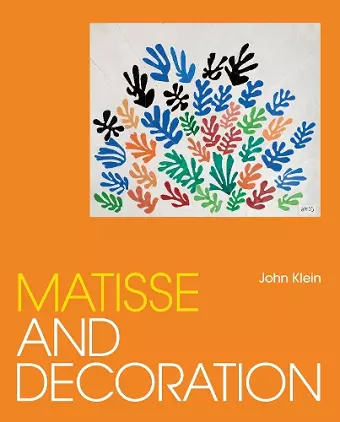Matisse and Decoration
Format:Hardback
Publisher:Yale University Press
Published:16th Oct '18
Currently unavailable, and unfortunately no date known when it will be back

A brand new look at the extremely beautiful, if underappreciated, later works of one of the most inventive artists of the 20th century
Between 1935 and his death at midcentury, Henri Matisse (1869–1954) undertook many decorative projects and commissions. These include mural paintings, stained glass, ceramic tiles, lead crystal pieces, carpets, tapestries, fashion fabrics, and accessories—work that has received no significant treatment until now. By presenting a wealth of new insights and unpublished material, including from the artist’s own correspondence, John Klein, an internationally acclaimed specialist in the art of Matisse, offers a richer and more balanced view of Matisse’s ambitions and achievements in the often-neglected later phases of his career.
Matisse designed many of these decorations in the innovative—and widely admired—medium of the paper cut-out, whose function and significance Klein reevaluates. Matisse and Decoration also opens a window onto the revival and promotion, following World War II, of traditional French decorative arts as part of France’s renewed sense of cultural preeminence. For the first time, the idea of the decorative in Matisse’s work and the actual decorations he designed for specific settings are integrated in one account, amounting to an understanding of this modern master’s work that is simultaneously more nuanced and more comprehensive.
“These 249 pages really are something of an artistic, as well as literary gem.” —David Marx, David Marx Book Reviews
“Klein’s scholarship and insights make this beautifully written volume required reading.”—Karl Buchberg, The Burlington Magazine
“The issue of the “decorative” in Matisse’s work has long been a thorn in the literature: while the artist never stopped affirming its importance, aiming to dismiss the negative connotations that plagued the concept of decoration in the context of modernist art, his enormous achievements in the field of decorative arts remain almost entirely understudied, with the exception of the Vence Chapel. Most Matisse scholars have taken the artist at his word and treated the “decorative” as a quality pertaining to his paintings. John Klein does not contradict this view, but he shows how Matisse’s thought evolved not only to admit that the “decorative” and decoration proper could meet, but also, after the Second World War, that the decorative arts were the most appropriate means to convey his idiosyncratic sense of the “decorative.” Examining many little-known commissions, and in some cases their relative failure, Klein reveals a gradual change in Matisse’s response to the demands of his patrons, and to the various media to which he gradually submits. Matisse, a stubborn man, prone to dissatisfaction with the translation of one of his designs into a medium he did not directly control, learned how to take advantage of a given medium’s limitations. This arc is formidably traced in this book, radically changing our understanding of Matisse’s career.”—Professor Yve-Alain Bois, Institute for Advanced Study, Princeton
“Matisse believed passionately in the life-enhancing potential of decorative art but, as John Klein reveals in this absorbing, fully documented, and comprehensive study, many of the commissions he eagerly accepted would involve frustration and setbacks, as he strove to master new techniques, work effectively with his collaborators, satisfy capricious patrons, and, above all, meet his own exacting standards. Written with perfect lucidity and rare candor, generously illustrated, and handsomely designed, Matisse and Decoration places the personal ambitions and unique creative process of the artist center stage, but never loses sight of the wider cultural and political context that shaped Matisse’s thought and action. The unfolding human drama Klein describes makes for enlightening and compelling reading.”—Professor Elizabeth Cowling, Edinburgh College of Art
ISBN: 9780300135640
Dimensions: unknown
Weight: 1270g
272 pages